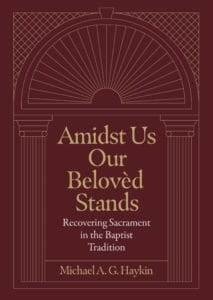
In this excerpt from Amidst Us Our Belovèd Stands, Michael A. G. Haykin presents six theses on the historical and modern practice of baptism and the Lord’s Supper in the Baptist Tradition.
In 1866, C. H. Spurgeon (1834–1892), well on his way to becoming something of a Dissenting icon, published a hymnal for his growing congregation in south London. Entitled Our Own Hymn-book. A Collection of Psalms and Hymns for Public, Social, and Private Worship, it contained a cornucopia of Evangelical hymnody, including a few of Spurgeon’s own creation.1 Among the latter is what has proven to be Spurgeon’s most enduring hymn, a Communion piece titled “Jesu’s Presence Delightful”:
Amidst us our Belovèd stands,
And bids us view His piercèd hands;
Points to His wounded feet and side,
Blest emblems of the Crucified.
What food luxurious loads the board,
When at His table sits the Lord!
The wine how rich, the bread how sweet,
When Jesus deigns the guests to meet!
If now with eyes defiled and dim,
We see the signs, but see not Him,
O may his love the scales displace,
And bid us see Him face to face!
Our former transports we recount,
When with Him in the holy mount,
These cause our souls to thirst anew,
His marr’d but lovely face to view.
Thou glorious Bridegroom of our hearts,
Thy present smile a heaven imparts:
Oh lift the veil, if veil there be,
Let every saint Thy beauties see.
This hymn’s emphasis on the spiritual presence of Christ at the Table is quite remarkable for a late nineteenth-century Baptist author, for the vast majority of Baptist leaders in that era held that the Supper was a time of remembrance, nothing more. But Spurgeon had long nourished his heart and mind on seventeenth-century Puritan and eighteenth-century Baptist authors, for whom the Lord’s Table was above all a place where God’s people had sweet fellowship with their Savior who was spiritually present with them.
It is readily apparent to many within the Baptist tradition that our practice of the Lord’s Supper, and to a somewhat lesser extent, of baptism, is not truly central to our experience of being Baptist. Indeed, beginning in the early nineteenth century many within this tradition have proudly rejected any hint of these ordinances being a means of grace or, to put it another way, sacramental events in which God is acting in the life of the believer. Ironically, throughout the twentieth century to the present day many of these very same churches, at least in North America, have been ardent about the practice of the altar call, which effectively usurps the roles assigned to baptism and the Table in classical Baptist ecclesiology. Truly natura abhorret vacuum! As the essays in Amidst Us Our Belovèd Stands will patently show, however, a different mentality prevailed in the Baptist tradition in its seventeenth-century origins and throughout most of the long eighteenth century. While the term “sacrament” was not usually employed, these Baptists were nonetheless deeply sacramental in their approach to doing church. And it is this author’s hope that this earlier tradition will be revived in our needy and trying times.
Six Theses
The reader of the eucharistic hymns of Joseph Stennett or of Anne Dutton’s Thoughts on the Lord’s Supper is left with the distinct impression that the regular celebration of the Lord’s Table must have been one of the great highlights of their Christian lives. They would have indeed agreed with C. H. Spurgeon when he said on one occasion, “I thank God that, coming to this table every Sabbath-day, as some of us do, and have done for years, we have yet for the most part enjoyed the nearest Communion with Christ here that we have ever known.” Yet, how different is the experience of most of their Baptist descendants today. The coronavirus pandemic that swept the world starting in 2020 led to most Baptist churches being unable to meet together and resorting to the use of video conferencing to maintain some semblance of weekly worship. Of course, despite the fabulous nature of such technology it really cannot replace in-person worship.
Now, it has been interesting to listen to what many Baptist pastors have lamented about this situation. The lack of corporate worship means no longer being able to hear the sung praise of God by his people. It means not being able to corporately pray or read God’s Word as a body of believers. It means that preachers are preaching without a sight of their congregations, and this can dull the fire of their words. The loss of such privileges is indeed to be lamented and hopefully creates a profound relish for the restoration of such means of grace. But what struck me was how few Baptist leaders have mentioned the loss of the Table.
These six theses sum up the key themes of this book, and, employing Baptist history, they also seek to speak to contemporary issues of Baptist piety and praxis.
- Baptism and the Lord’s Supper belong to the very essence of the church.
- Baptism and the Lord’s Supper are means of grace in the hands of the Holy Spirit.
- Baptism is the public sign of the new covenant, which has been sealed to the believer’s heart by the Holy Spirit. In this uniquely public way, the Christian declares that he has embraced Christ’s saving work and that he is Christ’s and Christ is his for all eternity (Song of Songs 2:16).
- The Lord’s Supper recommits Christians to the lordship of Christ and to one another, and in fellowship with their brothers and sisters they receive assurance that he has “cast all their sins into the depths of the sea” (Micah 7:19).
- The altar call that became common in many Baptist churches during the twentieth century has undermined a rich understanding of baptism and the Lord’s Supper in Baptist communities.
- In modern Western society, as in the past, joyful participation in the sacraments of baptism and the Lord’s Supper in Baptist communities is a truly revolutionary act.
This post was adapted from Amidst Us Our Belovèd Stands: Recovering Sacrament in the Baptist Tradition by Michael A. G. Haykin (Lexham Press, 2022).






